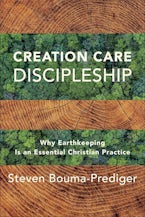
Sanctuary
Being Christian in the Wake of Trump
By: Heidi Neumark
240 Pages
- Hardcover
- ISBN: 9780802878397
- Published By: Eerdmans
- Published: September 2020
$24.99
In Sanctuary: Being Christian in the Wake of Trump, Heidi B. Neumark creates a vision for congregational ministry that is grounded in the scriptural call to compassion and generosity: “Do not neglect to show hospitality to strangers, for by doing that some have entertained angels without knowing it” (Hebrews 13:2). Weaving together stories from Trinity Lutheran Church in New York City where she serves as pastor, as well as other formative moments in her ministry, Neumark juxtaposes a Christian call to care for immigrants and homeless LGBTQ youth against a political backdrop that is increasingly hostile to these communities.
The book is set up as a devotional that moves through the liturgical year, except in lieu of a focus on scripture, each chapter begins with a quote from Donald Trump. The stories that follow unpack his words with contrasting narratives rooted in the relationships Neumark has with her congregants, effectively humanizing the people targeted by the racist and xenophobic stereotypes found in Trump’s rhetoric. Despite beginning each chapter with Trump’s words, the author’s stories are the strongest when Trump fades into the background, centering the voices and experiences of those individuals and populations who are frequently pontificated about but rarely listened to.
Instead of limiting her stories to Trump’s tenure as president, Neumark incorporates a broad historical overview of housing and workplace policies that specifically target and disenfranchise people living in poverty, immigration populations, and LGBTQ communities. Highlighting Trump’s words and policies shows the amplification of injustice under his presidency, but she takes pains to hold accountable past and future political parties in power. As Lenny Duncan emphasizes in the foreword, “I’m not even sure whether the next election matters as much as the revelation that, in a lot of ways, this is who we are as a country. This is us at our core” (ix). Neumark issues a communal call to justice that remains relevant regardless of who occupies the White House.
The overall format of a devotional provides a unique foil to its political arguments, successfully allowing Neumark to use liturgical imagery to create a wider context for the personal and communal stories she chronicles. She carefully unpacks the theology and scriptural connections to each liturgical season and describes the accompanying rituals and traditions enacted at Trinity Lutheran Church. In each chapter, Neumark’s descriptions of this liturgy are synonymous with its Greek origins as the “work of the people.” In several instances, the author describes the necessary transformations of historical worship spaces, particularly the stained-glass images of white children, white disciples, and a white Jesus that reflected Trinity’s original 1908 German congregation, to better embody the multicultural and multiracial congregation of the twenty-first century.
Neumark does not gloss over the challenges of curating a worship space to reflect an ever-changing church. Instead, the author positions her role as one who is also learning and shifting her own assumptions and biases in pastoral leadership. She strives to ensure the church’s shared sacred space meets the competing needs and expectations that different congregants bring with them. As an onlooker who might wonder if Trinity’s congregation is above the conflict or territorial instincts that are typical for congregational life, it is refreshing when Neumark is quick to name the ongoing challenges of compromise between different factions in her own church. Through each disappointment or hesitation to change, the call to care for and prioritize those who are most in need becomes the grounding force that allows the church to transform, both its physical space and the people it houses.
Neumark’s narrative travels from Trinity to Argentina, Germany, and the southern border between the United States and Mexico, bringing together an overarching theme of what it means to cultivate sanctuary as a practice rather than a static place, and what it requires of those who hold privilege across class, race, nationality, sexuality, and gender identity. Even though Neumark’s personal relationships and experiences in ministry form the heart of this work, she is intentional in forging a connection with readers who might wonder if these experiences are relevant in radically different contexts (for example, in a midwestern, suburban, upper middle class, white congregation with purple politics.) Neumark lifts up examples of colleagues serving in these different contexts and uses her experiences to illustrate how churches can practice sanctuary in a variety of settings. She also provides starting points to conversations a different kind of congregation might have that allow them to begin unpacking their privileges or reframe their faith practices toward hospitality for the most vulnerable among their community.
Overall, Neumark takes a tired national conversation about Trump’s politics and turns it into a refreshing conversation focused on those who are most impacted by those politics. Her love for her congregation and the clarity of her vision for a particular kind of pastoral ministry are evident on every page, inviting the reader to consider how they might focus their own energy away from declaring what they are against toward proclaiming what they most believe. As a politically driven text it presents a clear call to policy reform aimed at protecting at-risk populations. As a faith-based devotional it is creative, accessible, and cultivates its own kind of sanctuary away from cynicism and fear.
Rev. Liz Miller is an independent scholar.
Liz MillerDate Of Review:September 17, 2022
Heidi Neumark is a Lutheran pastor who has served congregations in the South Bronx and Manhattan for almost four decades. In her present position, she is also the cofounder and executive director of a shelter for homeless LGBTQIA+ youth. She is the author of two books, Breathing Space: A Spiritual Journey in the South Bronx and Hidden Inheritance: Family Secrets, Memory and Faith, about the discovery of her Jewish heritage and her grandfather's death in a concentration camp.











